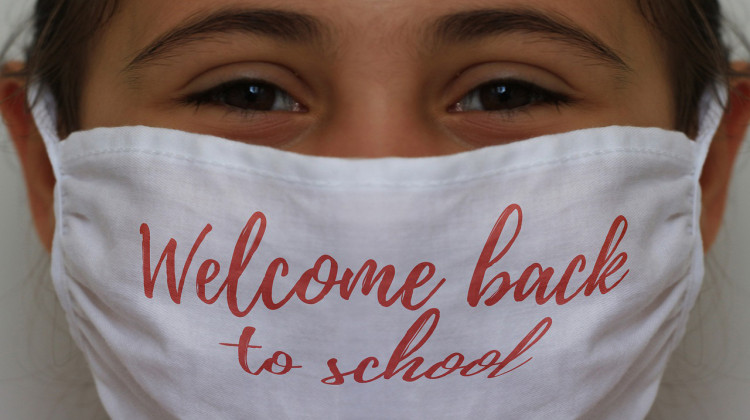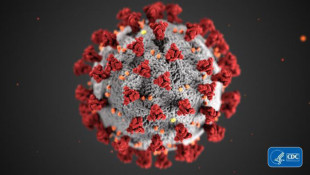
Experts say if your child is wearing a mask properly (covering mouth and nose), it will offer the necessary protection against COVID-19 and protect others around them.
Gerd Altmann/PixabayLocal school boards, school officials, teachers and parents are suddenly finding themselves on the frontlines in the battle to keep kids safe from contracting COVID-19 at school.
Across the country and across the state, each school district is faced with important decisions on safety protocols: masks or no masks? Vaccine mandates or not? What should the district do when infection occurs?
But misinformation, politics and emotions are sometimes getting in the way, leaving parents and school officials with confusing, mixed messages.
We reviewed the latest research on the virus and the delta variant, and spoke to Richard Kuhn, to address some of the most common bits of misinformation about COVID-19 circulating online lately.
Kuhn is the director of the Purdue Institute of Inflammation, Immunology and Infectious Disease and the editor-in-chief of the journal Virology.
The coronavirus is so small it can get in even if you are wearing a mask, so why bother?
Masks recommended by the CDC are effective at reducing the amount of virus circulating around. If your child is wearing a mask properly (covering mouth and nose), this will offer the necessary protection. While research on masks and COVID-19 specifically is fairly limited given the novelty of the disease, there was a significant reduction in flu and respiratory virus cases last year when masks and social distancing were enforced in schools. This shows that masks provide protection against viruses. It is also important to note that masks are mainly to protect those around you.
“The mask for both directions is a very important mitigator,” Kuhn said.
“For this disease, there's very clear evidence that an appropriately made mask of two layers of cloth, for example, surgical masks and N95... all effectively remove a large fraction of virus from moving either out when someone exhales or whether someone is exposed to it from another person."
If there are breakthrough infections and people are getting COVID-19 even when they are vaccinated, why should I or my children get the COVID-19 vaccine?
Vaccines are not meant to completely prevent infection, Kuhn said. They are meant to prevent serious diseases, hospitalization and death. Still, the rate of breakthrough cases (which are defined as individuals testing positive for COVID-19 at least 2 weeks after their final vaccine shot) is 0.179% -- in Indiana as of Wednesday, August 11, there have been 5,323 breakthrough cases out of more than 2 million vaccinated people .
But even when a breakthrough infection happens, most recent data from the Indiana State Department of Health shows that only 0.006% (185 people) were hospitalized and only 69 people died.
Vaccines amplify the effect of COVID-19 if you have a breakthrough infection.
There is no data to support that this is happening, Kuhn said. The current surge in hospitalization we are seeing is overwhelmingly in unvaccinated people.
Those who claim vaccines amplify the effect of COVID-19 are referring to a process called antibody dependent enhancement or ADE.
“It does occur in a few other viruses,” Kuhn said. “But so far, the data is not there for this virus. And it's unlikely that the vaccine, the way it's designed, is going to enhance disease.”
Part of the vaccine development process is to look out for ADE in animal trials and early stage clinical trials in humans. COVID-19 vaccine trials did not turn up any sign of ADE. Beyond the trials, CDC data show that 167 million people have been fully vaccinated around the country with no such issue.
My child got COVID and has an antibody test to prove it, why do they need to get a vaccine?
The protection received from a prior infection with the virus or the vaccine does not provide complete, sterilizing immunity. It means that the person can still get infected with the virus and could spread the virus to other people.
“Data suggests that the vaccine produces a better immune response than many natural infections,” Kuhn said.
A recent CDC study shows that those who got infected with COVID-19 and remain unvaccinated were more than twice as likely to get reinfected than those who are vaccinated.
“Also their child was probably infected with an earlier version of the virus, not the widely circulating delta variant, and so natural protection will not be as strong against the currently circulating virus.”
But kids are not seriously affected by COVID-19, why should they get vaccinated?
COVID-19 is a fairly new disease and there is a lot that scientists do not know. They are still unsure what kind of long-term effects it may have on grownups and children. There just hasn’t been enough time to study it.
It is also important to remember that some kids might develop a condition called multi-system inflammatory syndrome or MIS-C. This is a rare condition that was observed in children after a COVID-19infection but it is an extremely serious one. Kids who get it may have organ failure, neurological damage and may end up hospitalized for weeks. As of June 30, CDC data show that 4,044 kids got MIS-C and 37 have died from it across the country.
COVID-19 is not going away -- shouldn’t we just live our lives normally?
It’s true that the virus may not disappear because there are animal reservoirs -- which means it can live and multiply in animal hosts. But, if enough people get vaccinated, the danger that the coronavirus poses to humans can be significantly reduced. The coronavirus could become as problematic as the common cold in that case as the virus will not be able to circulate and mutate into more aggressive variants.
“I think we certainly can do a good job if we can get the world population vaccinated, that this virus will probably become, if anything, a minor annoyance,” Kuhn said.
“Yes, it's hard to imagine that we can eradicate it because there are animal reservoirs. But by the same token, if we don't do anything, we're going to continue to evolve this virus and there will be new viruses that are related to it.”
But with the delta variant, it seems like vaccinated people can carry as much virus as unvaccinated people. Doesn’t this mean that the virus still has the chance to circulate around and mutate even with more vaccination rates?
“The variants are occurring because of the number of replication cycles. There’s the possibility that a vaccinated person will have fairly high amounts of virus. And so yes, variants can still occur in that population,” Kuhn said. “Again, that's why we need to make sure that even vaccinated people are taking precautions at this point.”
Still, Kuhn said that for vaccinated persons to have very high virus load is not common. The more people who are vaccinated, the less virus there is in the community and the less probability that people who are vaccinated will be exposed.
“And remember, the reason for getting vaccinated is to prevent severe disease. That's our most important thing right now to prevent severe disease. And so that's why you want to get vaccinated,” Kuhn added.
 DONATE
DONATE





 View More Articles
View More Articles



 Support WFYI. We can't do it without you.
Support WFYI. We can't do it without you.